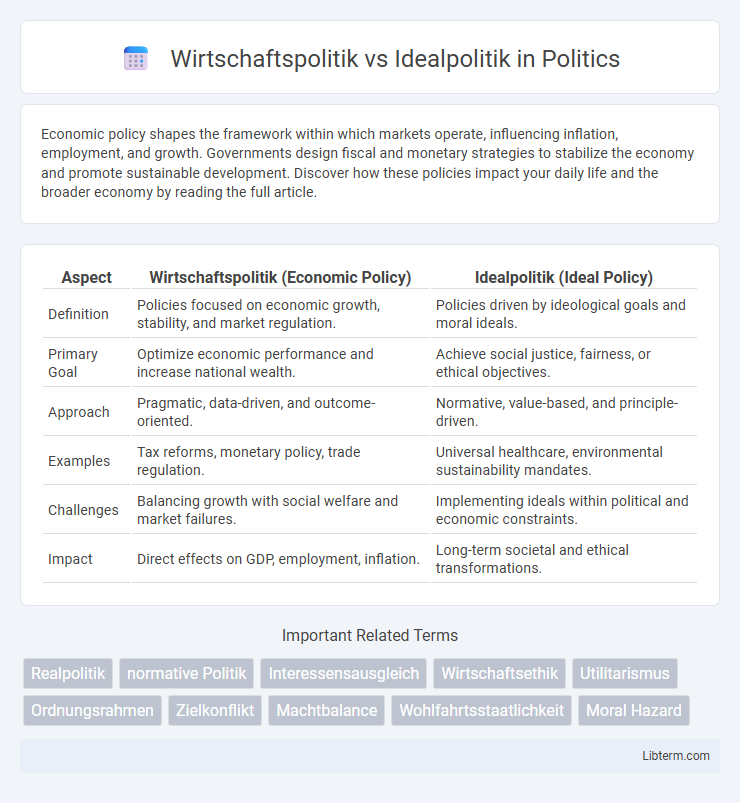Economic policy shapes the framework within which markets operate, influencing inflation, employment, and growth. Governments design fiscal and monetary strategies to stabilize the economy and promote sustainable development. Discover how these policies impact your daily life and the broader economy by reading the full article.
Table of Comparison
| Aspect | Wirtschaftspolitik (Economic Policy) | Idealpolitik (Ideal Policy) |
|---|---|---|
| Definition | Policies focused on economic growth, stability, and market regulation. | Policies driven by ideological goals and moral ideals. |
| Primary Goal | Optimize economic performance and increase national wealth. | Achieve social justice, fairness, or ethical objectives. |
| Approach | Pragmatic, data-driven, and outcome-oriented. | Normative, value-based, and principle-driven. |
| Examples | Tax reforms, monetary policy, trade regulation. | Universal healthcare, environmental sustainability mandates. |
| Challenges | Balancing growth with social welfare and market failures. | Implementing ideals within political and economic constraints. |
| Impact | Direct effects on GDP, employment, inflation. | Long-term societal and ethical transformations. |
Einführung in Wirtschaftspolitik und Idealpolitik
Wirtschaftspolitik involves practical strategies and measures governments implement to regulate economic activities and achieve growth, stability, and social welfare. Idealpolitik, in contrast, emphasizes normative goals and theoretical frameworks guiding economic policy decisions toward an ideal social and economic order. Understanding the distinction between Wirtschaftspolitik's pragmatic approach and Idealpolitik's value-driven objectives is crucial for analyzing policy formulation and economic governance.
Grundprinzipien der Wirtschaftspolitik
Wirtschaftspolitik focuses on practical strategies and policies aiming to stabilize the economy, ensure growth, and maintain employment through concrete measures like fiscal policy and monetary controls. Idealpolitik, in contrast, is based on normative principles and ideal goals, often emphasizing ethical, social, or long-term visions without immediate constraints. The Grundprinzipien der Wirtschaftspolitik include efficiency, stability, and social justice, guiding real-world decision-making to balance economic performance with societal welfare.
Leitgedanken der Idealpolitik
Leitgedanken der Idealpolitik orientieren sich an langfristigen gesellschaftlichen Zielen wie Gerechtigkeit, Freiheit und Nachhaltigkeit, statt kurzfristigen wirtschaftlichen Effizienzsteigerungen. Wirtschaftspolitik konzentriert sich primar auf die Steuerung von Markten, Wachstum und Stabilitat unter Berucksichtigung aktueller wirtschaftlicher Rahmenbedingungen. Idealpolitik stellt normative Werte in den Mittelpunkt und fordert eine politische Gestaltung, die uber okonomische Zwange hinaus gesellschaftliche Ideale verwirklicht.
Historische Entwicklung beider Ansätze
Wirtschaftspolitik developed as a pragmatic approach to managing economic cycles and structural challenges, emphasizing state intervention to stabilize markets while preserving economic growth. Idealpolitik, rooted in ideological frameworks, aims to shape society according to normative principles, often prioritizing ethical or utopian goals over practical constraints. Historically, Wirtschaftspolitik gained prominence during the 20th century's economic crises, whereas Idealpolitik surfaced in political movements advocating systemic transformation aligned with specific ideals.
Zielkonflikte zwischen Wirtschaftspolitik und Idealpolitik
Zielkonflikte zwischen Wirtschaftspolitik und Idealpolitik entstehen, wenn wirtschaftliche Massnahmen kurzfristig Wachstum und Stabilitat fordern, jedoch langfristige ethische oder soziale Ideale wie Nachhaltigkeit oder soziale Gerechtigkeit beeintrachtigen. Wirtschaftspolitik zielt oft auf Effizienz und Wettbewerbsfahigkeit ab, wahrend Idealpolitik normative Werte wie Umweltschutz und soziale Inklusion priorisiert. Diese Divergenz erfordert eine sorgfaltige Abwagung, um wirtschaftliche Interessen mit gesellschaftlichen Zielen in Einklang zu bringen.
Praxisbeispiele: Wirtschaftspolitik in Aktion
Wirtschaftspolitik manifests through concrete measures such as fiscal stimulus packages, regulatory reforms, and trade policies aimed at stabilizing markets and promoting growth. Praxisbeispiele include Germany's energy transition policies (Energiewende) fostering renewable energy investments and job creation while Idealpolitik represents normative goals like social equity or sustainability without immediate practical enforcement. Policy instruments in Wirtschaftspolitik prioritize measurable economic outcomes, contrasting with the theoretical aspirations of Idealpolitik.
Praxisbeispiele: Idealpolitik im Einsatz
Idealpolitik manifests in practice through policies that prioritize long-term societal goals over short-term economic gains, such as Germany's Energiewende, which promotes renewable energy adoption despite initial economic costs. These examples illustrate the focus on sustainability and social welfare rather than pure market efficiency, contrasting with Wirtschaftspolitik's emphasis on pragmatic economic management. The shift towards Idealpolitik often involves government interventions designed to address environmental and social challenges that the market alone cannot resolve effectively.
Vor- und Nachteile beider Politikansätze
Wirtschaftspolitik emphasizes pragmatic, market-oriented strategies to stabilize and grow economies, offering advantages such as flexibility and responsiveness to real-world economic conditions but risks short-term focus and social inequality. Idealpolitik prioritizes normative goals and ethical considerations, aiming to achieve long-term societal ideals, which can foster fairness and sustainability yet may lack practicality and face implementation challenges. Balancing Wirtschaftspolitik's efficiency with Idealpolitik's values remains central to effective policy-making.
Auswirkungen auf Gesellschaft und Wirtschaft
Wirtschaftspolitik beeinflusst direkt das wirtschaftliche Wachstum, die Beschaftigungsrate und die Einkommensverteilung, was zu messbaren Veranderungen im Lebensstandard und der sozialen Stabilitat fuhrt. Idealpolitik hingegen orientiert sich an ethischen und gesellschaftlichen Idealen, deren Umsetzung oft langfristige soziale Transformationen fordert, jedoch kurzfristig wirtschaftliche Unsicherheiten verursachen kann. Die Balance zwischen pragmatischer Wirtschaftspolitik und normativer Idealpolitik bestimmt massgeblich die nachhaltige Entwicklung von Gesellschaft und Wirtschaft.
Zukunftsperspektiven: Integration oder Gegensatz?
Wirtschaftspolitik und Idealpolitik stehen in der Zukunftsperspektive vor der Herausforderung, eine Balance zwischen praktischer Umsetzbarkeit und ethischen Zielsetzungen zu finden, wobei Integration nachhaltiger Wirtschaftsstrategien und sozialer Idealvorstellungen zunehmend als Losungsansatz gilt. Die Debatte um die Zukunft dieser politischen Ansatze konzentriert sich auf die Moglichkeit einer harmonischen Verschmelzung zur Forderung nachhaltiger Entwicklung versus die Gefahr eines unauflosbaren Gegensatzes aufgrund divergierender Zielprioritaten. Fortschrittliches Wirtschaftshandeln erfordert die zunehmende Berucksichtigung sozialer Werte und Umweltaspekten, was die Integration von Idealpolitik in wirtschaftspolitische Massnahmen unverzichtbar macht.
Wirtschaftspolitik Infographic

 libterm.com
libterm.com